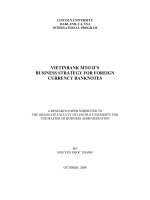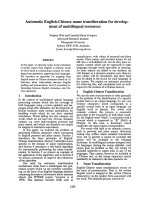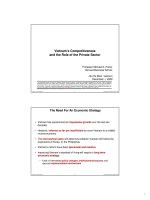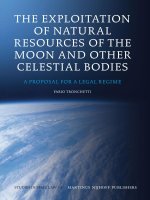Vietnam’s LongTerm Strategy for Exploitation of Mineral Resources
Bạn đang xem bản rút gọn của tài liệu. Xem và tải ngay bản đầy đủ của tài liệu tại đây (609.89 KB, 3 trang )
3
Legal Update
Energy
Infrastructure
Vietnam
01 June 2012
Vietnam’s Long-Term Strategy for Exploitation of Mineral Resources
Background
Vietnam has recently issued several key pieces of
legislation necessary to implement the 2010 Mineral
Law.
On 22 December 2011, Vietnamese Prime Minister
(“PM”) signed Decision No. 2427/QD-TTg (“Decision
2427”) approving the national mineral resources
strategy to 2020 with a vision to 2030.
The same day, the Government also issued
Resolution No. 103/NQ-CP (“Resolution 103”) on its
action plan for implementing the Politburo’s
Resolution No. 02-NQ/TW (“Resolution 02”), dated
25 April 2011, on strategic orientations for mineral
resources and mineral exploitation to 2020 with a
vision to 2030.
Most recently, on 9 January 2012, the PM released
Directive 02/CT-TTg (“Directive 02”) on
strengthening State management of exploration,
exploitation, processing, usage and export of
minerals.
This article describes the main points of Decision
2427, Resolution 103 and Directive 02, and the
impact of the developing mineral strategy on
exploration and exploitation activities in Vietnam.
Decision 2427 Approves Mineral Strategy
Article 9 of the Mineral Law required the
government to prepare a twenty-year strategy for
mineral resources, covering:
• Viewpoint on directions for and goals of basic
geological surveys of mineral resources; on
protection of untapped minerals; and on
exploration, mining, processing and use of
minerals in an appropriate and cost-saving
manner.
• Orientation on basic geological surveys of mineral
resources; on protection of untapped minerals;
on exploration and mining of each category of
minerals; and on appropriate and cost-effective
processing and use of minerals after they have
been mined.
• Tasks and solutions for basic geological surveys
of mineral resources; for protection of untapped
minerals; for exploration and mining of each
category of minerals; for appropriate and costeffective processing and use of minerals after they
have been mined; and for preservation of reserves
of national mineral resources.
VIEWPOINT
The mineral strategy approved in Decision 2427
stipulates that
• As non-renewable natural resources, minerals
must be managed, protected, exploited and
used rationally, economically and efficiently to
meet the requirements of industrialisation and
modernisation of the country.
• Survey and evaluation of mineral resources must
be implemented in advance to permit efficient
planning for exploration, exploitation, processing,
and use of mineral resources and national
reserves.
• Exploration and mining must be associated with
the potential for processing and use of each type
of mineral, in light of the needs of all economic
sectors.
• For large-scale deposits of minerals, only
processed products with high economic value may
be exported.
• International cooperation must be utilised
to access current scientific knowledge and
environmentally-friendly technologies in
surveying, exploring for, mining, and processing
of minerals.
ORIENTATION
Decision 2427 focuses on
• carrying out basic geological surveys for minerals;
• exploring, exploiting and processing groups of
minerals such as: coal, uranium, metals, nonmetals, construction materials, natural thermal
water, mineral water, oil and gas; and
• implementing international cooperation.
TASKS AND SOLUTIONS
Decision 2427 describes a path forward in several
specific areas of regulation:
With respect to management and planning,
• perfecting the system of legal documents
governing minerals; improving management
capacity from the central to local levels of
government; ensuring close coordination between
central and local governments to speed up
inspection and examination of mineral activities;
responding to violations of mineral regulations,
and restructuring the mining and mineral
processing industry;
• setting up plans on mineral management
according to the provisions of the Mineral Law
and the orientation of the Strategy delineating the
areas of national mineral reserves.
With respect to science and technology,
• training a contingent of highly qualified
professionals;
• carrying out a step-by-step application of
advanced techniques, modern equipment in
surveying, exploring, mining and processing of
minerals;
• improving capacity of pit mining technology;
• developing technical standards for mining and
processing equipment and technology to protect
the environment and preserve natural resources.
With respect to finance,
• prioritising the annual allocation of sufficient
funds from the State budget for basic geological
surveys of mineral resources in accordance with
approved plans;
• increasing investment in scientific research and
application of new technologies in geological
surveys, exploration, mining and processing of
minerals;
• adjusting the financial policies governing the
export of minerals in the orientation of only
exporting high value processed products from
large-scale deposits of minerals;
• setting up a mechanism of incentives in
accordance with specific occupations to ensure
stable development of human resources for
survey, exploration, mining and processing of
minerals.
With respect to environmental protection,
• inspecting and supervising the implementation of
environmental protection legislation;
• strictly handling violations according to law.
Resolution 103 Sets Out an Action Plan
Among other things, the action plan sets out the
tasks of dissemination of mining legislation and
completion of the legal system on mining.
Of note, the action plan requires the following draft
decrees to be completed within 2012:
• Decree detailing the implementation of the
Mining Law. This has been completed. On
9 March 2012, the Vietnamese Government
issued Decree No. 15/2012/ND-CP (“Decree 15”)
detailing the implementation of a number of
articles in the Mineral Law.
• Decree stipulating auctions of mineral
exploitation rights. This has been completed. On
26 March 2012, the Vietnamese Government
issued Decree No. 22/2012/ND-CP (“Decree
22”). Decree 22 provides detailed regulations
on Article 79.2 of the Mineral Law with respect
to the principles, conditions and procedures for
auctioning mineral mining rights.
• Decree on mineral resources strategy up to 2020
with a vision to 2030.
• Decree stipulating administrative sanctions in the
mining sector.
Directive 02 Gives Specific Instructions
Among other things, Directive 02 contains the
following specific instructions:
• Export of raw, unprocessed minerals is banned.
• Exploitation of coal and minerals used to
manufacture cement is allowed, subject to
approved master plans.
• No more licences will be granted for the
2 Mayer Brown JSM | Vietnam’s Long-Term Strategy for Exploitation of Mineral Resources
exploration or exploitation of bauxite and
production of alumina until the Tan Rai and
Nhan Co mines for production of alumina in Lam
Dong and Dak Nong have become operational
and have achieved high socio-economic value.
No new exploration licences will be issued in the
Northern provinces.
• The exploration and exploitation of gold must
use in-depth processing and modern techniques
which cause no harm to the environment.
New licenses for exploitation of placer gold are
prohibited.
• Beginning 1 July 2012, the export of unprocessed
titanium ore will be banned;
Contact Us
For inquiries related to this Legal Update, please
contact the following persons or your usual contacts
with our firm.
Kevin Hawkins
Partner
T: + 84 8 3822 8860 x116
E:
Orsolya Szotyory-Grove
Associate
T: + 84 83 822 8860 x117
E:
• All mining projects must be appraised by the
Appraisal Council of the Ministry of Industry
and Trade, the Ministry of Construction, and
the relevant provincial or municipal People’s
Committee. Only those projects which employ
advanced and environmentally friendly
techniques will be approved.
Conclusion
While these legal instruments demonstrate the
efforts of the Vietnamese Government to draft
stricter provisions on exploiting and preserving
mineral resources, they imply that investors in the
mining sector will face greater regulatory obstacles.
Mayer Brown JSM is part of Mayer Brown, a global legal services organisation advising clients across the Americas, Asia and Europe. Our presence in the
world’s leading markets enables us to offer clients access to local market knowledge combined with global reach.
We are noted for our commitment to client service and our ability to assist clients with their most complex and demanding legal and business challenges
worldwide. We serve many of the world’s largest companies, including a significant proportion of the Fortune 100, FTSE 100, DAX and Hang Seng Index
companies and more than half of the world’s largest banks. We provide legal services in areas such as banking and finance; corporate and securities;
litigation and dispute resolution; antitrust and competition; employment and benefits; environmental; financial services regulatory & enforcement;
government and global trade; intellectual property; real estate; tax; restructuring, bankruptcy and insolvency; and wealth management.
OFFICE LOCATIONS AMERICAS: Charlotte, Chicago, Houston, Los Angeles, New York, Palo Alto, Washington DC
ASIA: Bangkok, Beijing, Guangzhou, Hanoi, Ho Chi Minh City, Hong Kong, Shanghai, Singapore
EUROPE: Brussels, Düsseldorf, Frankfurt, London, Paris
TAUIL& CHEQUER ADVOGADOS in association with Mayer Brown LLP: São Paulo, Rio de Janeiro
ALLIANCE LAW FIRM: Spain (Ramón & Cajal)
Please visit www.mayerbrownjsm.com for comprehensive contact information for all Mayer Brown offices.
This publication provides information and comments on legal issues and developments of interest to our clients and friends. The foregoing is
intended to provide a general guide to the subject matter and is not intended to provide legal advice or a substitute for specific advice concerning individual situations. Readers should seek legal advice before taking any action with respect to the matters discussed herein. Please also read
the Mayer Brown JSM legal publications Disclaimer.
Mayer Brown is a global legal services provider comprising legal practices that are separate entities (the “Mayer Brown Practices”). The Mayer Brown Practices are: Mayer Brown LLP and Mayer Brown Europe
– Brussels LLP, both limited liability partnerships established in Illinois USA; Mayer Brown International LLP, a limited liability partnership incorporated in England and Wales (authorized and regulated by the
Solicitors Regulation Authority and registered in England and Wales number OC 303359); Mayer Brown, a SELAS established in France; Mayer Brown JSM, a Hong Kong partnership and its associated entities
in Asia; and Tauil & Chequer Advogados, a Brazilian law partnership with which Mayer Brown is associated. “Mayer Brown” and the Mayer Brown logo are the trademarks of the Mayer Brown Practices in their
respective jurisdictions.
© 2012. The Mayer Brown Practices. All rights reserved.









